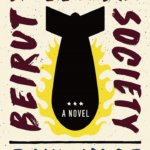16 Dec / Booklist Backlist: Fictional Worlds, Real Meals [in Booklist]

 Yeah, sure: Proust and his madeleine-dipped-in-tea set the barometer for toothsome leitmotifs. I admit to the possibility that my academic indoctrination in his long, long musings made me quite the hungry reader. Or maybe I’m just always greedy for nourishment, with preferences in the belly – as well as on the page – tending toward the ethnic. Here are some notable novels published this year that, despite even their most drastic, intense narrative circumstances, left me ravenous and sent me foraging in the kitchen, or, more likely, out to other kitchens. True confession: I’m cooking-averse but eating-obsessed!
Yeah, sure: Proust and his madeleine-dipped-in-tea set the barometer for toothsome leitmotifs. I admit to the possibility that my academic indoctrination in his long, long musings made me quite the hungry reader. Or maybe I’m just always greedy for nourishment, with preferences in the belly – as well as on the page – tending toward the ethnic. Here are some notable novels published this year that, despite even their most drastic, intense narrative circumstances, left me ravenous and sent me foraging in the kitchen, or, more likely, out to other kitchens. True confession: I’m cooking-averse but eating-obsessed!
 Beirut Hellfire Society by Rawi Hage. 2019. Norton.
Beirut Hellfire Society by Rawi Hage. 2019. Norton.
For second-generation undertaker Pavlov, death is his inherited livelihood. Like his late father, Pavlov provides the final journey for outcast cadavers no one else will touch. There are corpses, yes, but also a bonfire dinner of meat and meze (small dishes).
 The Farm by Joanne Ramos. 2019. Random.
The Farm by Joanne Ramos. 2019. Random.
The clash of race, ethics, class, and ambition drives Ramos’ scintillating debut featuring a luxurious surrogacy facility of providers, buyers, and decision-makers. Among immigrant Filipino childcare providers, pancit (noodles) meals are reminders of loved ones at home.
 Nothing to See Here by Kevin Wilson, 2019. Ecco.
Nothing to See Here by Kevin Wilson, 2019. Ecco.
Amidst Wilson’s latest heartstring-tugging, drop-jaw shocking, guffaw-inducing, (can’t resist) highly combustible entertainment, privilege, power, and inequity whorl through the relationship between two unlikely boarding school roommates who reconnect a decade later. Scholarship-enabled Lillian aspires to a future that will allow her a Milky Way bar for breakfast every morning.
 On Earth We’re Briefly Gorgeous by Ocean Vuong. 2019. Penguin Press.
On Earth We’re Briefly Gorgeous by Ocean Vuong. 2019. Penguin Press.
After escaping Vietnam, Little Dog grows up with his grandmother’s stories of survival, and his mother’s monstrous abuses and unrelenting sacrifices. Writing will save his life. Godiva chocolates sustain his mother, but more memorable are her egg rolls: Vietnamese chả giò; made with rice paper, they differ considerably from other Asian versions.
 Parade by Hiromi Kawakami. Translated by Allison Markin Powell. 2019. Soft Skull.
Parade by Hiromi Kawakami. Translated by Allison Markin Powell. 2019. Soft Skull.
In this companion title to Man Asian Literary Prize finalist, Strange Weather in Tokyo (2012), a septuagenarian retired high-school teacher and his three-decades-younger former student Tsukiko spend a leisurely summer afternoon cooking, eating somen (thin wheat noodles), and sharing memories.
 The Plotters by Un-Su Kim. Translated by Sora Kim-Russell. 2019. Doubleday.
The Plotters by Un-Su Kim. Translated by Sora Kim-Russell. 2019. Doubleday.
Kim’s dark, dark wit enhances an irresistible sociopolitical parable about a professional assassin that delights and dismays. Rice porridge – called juk, which triggers nurturing memories in every Korean – nourishes the (motherless) killer after a near-fatal encounter.
 Queen of Bones by Teresa Dovalpage. 2019. Soho.
Queen of Bones by Teresa Dovalpage. 2019. Soho.
A Cuban refugee returns to Havana with his American wife to confront unfinished relationships from decades past, but the reunions don’t end well. Despite fatal attractions, café con leche – Cuban-style – is the best way to start any morning.
 The Shadow King by Maaza Mengiste. 2019. Norton.
The Shadow King by Maaza Mengiste. 2019. Norton.
Mengiste channels her great-grandmother who, Mulan-style, answered Emperor Haile Selassie’s demand for first sons to fight against Fascist Italy despite her father’s protestations. As Mussolini and war approach, orphaned servant Hirut matures into womanhood as warrior, shadow king, and survivor. Nourishment proves scarce throughout, but a personal quest for injera (spongy, sourdough flatbread) can’t be denied.
 The Stationery Shop by Marjan Kamali. 2019. Gallery.
The Stationery Shop by Marjan Kamali. 2019. Gallery.
Young lovers torn apart by class, politics, and history during the violent tumult of 1950s Iran are forced to endure separate lives. Years later across oceans, the girl, Roya, introduces her Boston husband-to-be to Persian fare with scrumptious koresh-e-bademjan (meat-and-eggplants stew).
Published: “Booklist Backlist: Fictional Worlds, Real Meals,” Booklist, December 15, 2019
